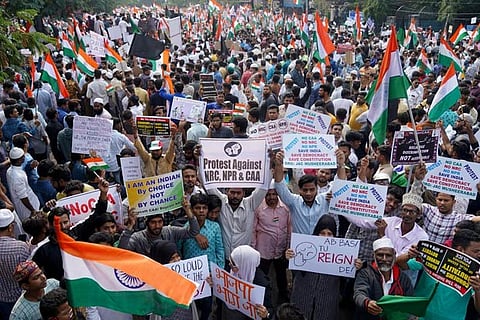

Chennai
Months of unparalleled mass protests followed — many of which turned violent — leading to a nationwide crackdown and the worst communal riots New Delhi had seen in decades. The CAA fast-tracks citizenship of Hindu, Sikh, Buddhist, Jain, Parsi and Christian immigrants from Afghanistan, Pakistan and Bangladesh who arrived in India before 2015. However, it excludes Muslims, a move that has been denounced for undermining India’s secular constitution.
“It is an anti-Muslim law. That’s not a perspective. ... It’s an objective reality. And, when combined with the National Population Register (NPR) and the National Register of Citizens (NRC), it tears through even what’s left of the pretense of India’s secularism and constitution,” writer and political activist Arundhati Roy said. Critics believe that the CAA, along with the ongoing nationwide registration drives, could become a means of excluding the minority Muslim population of the country. The current government has recently been pushing to complete the national registries, but minority groups fear that they too will be used to discriminate against non-Hindus.
Prime Minister Narendra Modi’s Hindu nationalist government has rejected the CAA’s “anti-Muslim” criticism. “I want to clarify it to my 130 crore Indians. The CAA will not have any effect on any religious community, be it Hindu, Muslim, Sikhs or Christians,” Modi said in a speech in Parliament in January. He also accused the opposition of spreading false information about the CAA and dividing the country in the name of religion.
Protests and the aftermath
Soon after the passing of the CAA, protests broke out throughout the country, including in the capital, New Delhi.
The protests in Shaheen Bagh — until that point an ordinary working-class Muslim neighbourhood in the city — soon snowballed, transforming the area into ground zero of the anti-CAA movement. “A wonderful, nascent solidarity across communities was building up in the massive resistance to these laws,” Roy said.
The demonstrations in Delhi were quickly met with a strict crackdown, as police entered universities and detained students. In Uttar Pradesh and Karnataka, at least 27 people were killed as protests turned violent.
The violence culminated in February’s bloody riots in northeast Delhi as pro-CAA groups clashed with anti-CAA protesters leaving 53 people from both Hindu and Muslim communities dead.
Aside from the religion-based classification for citizenship, the pushback to the CAA also came from a nativist sentiment amid fears of a demographic change in the northeastern state of Assam.
Those against the implementation of the act in Assam believe that it would lead to an influx of Hindu migrants from neighbouring Bangladesh that would overrun indigenous communities, threatening their language, culture and tradition and burdening resources. In December 2019, when the CAA was cleared to be introduced in parliament, violent protests broke out in Assam. Tensions in the state escalated when the act was later passed, leaving five people dead.
The road ahead
After a long break due to the coronavirus, 18 organisations opposing the CAA have announced fresh protests.
But, while the renewed protests are set to begin, there is still ambiguity over when the CAA will be implemented.
The Home Ministry missed its June deadline to finalise the rules of the act and sought three more months, citing the COVID-19 situation. In November, Home Minister Amit Shah said the law was in place and would be “implemented” depending on the coronavirus situation.
This article was provided by Deutsche Welle
Visit news.dtnext.in to explore our interactive epaper!
Download the DT Next app for more exciting features!
Click here for iOS
Click here for Android